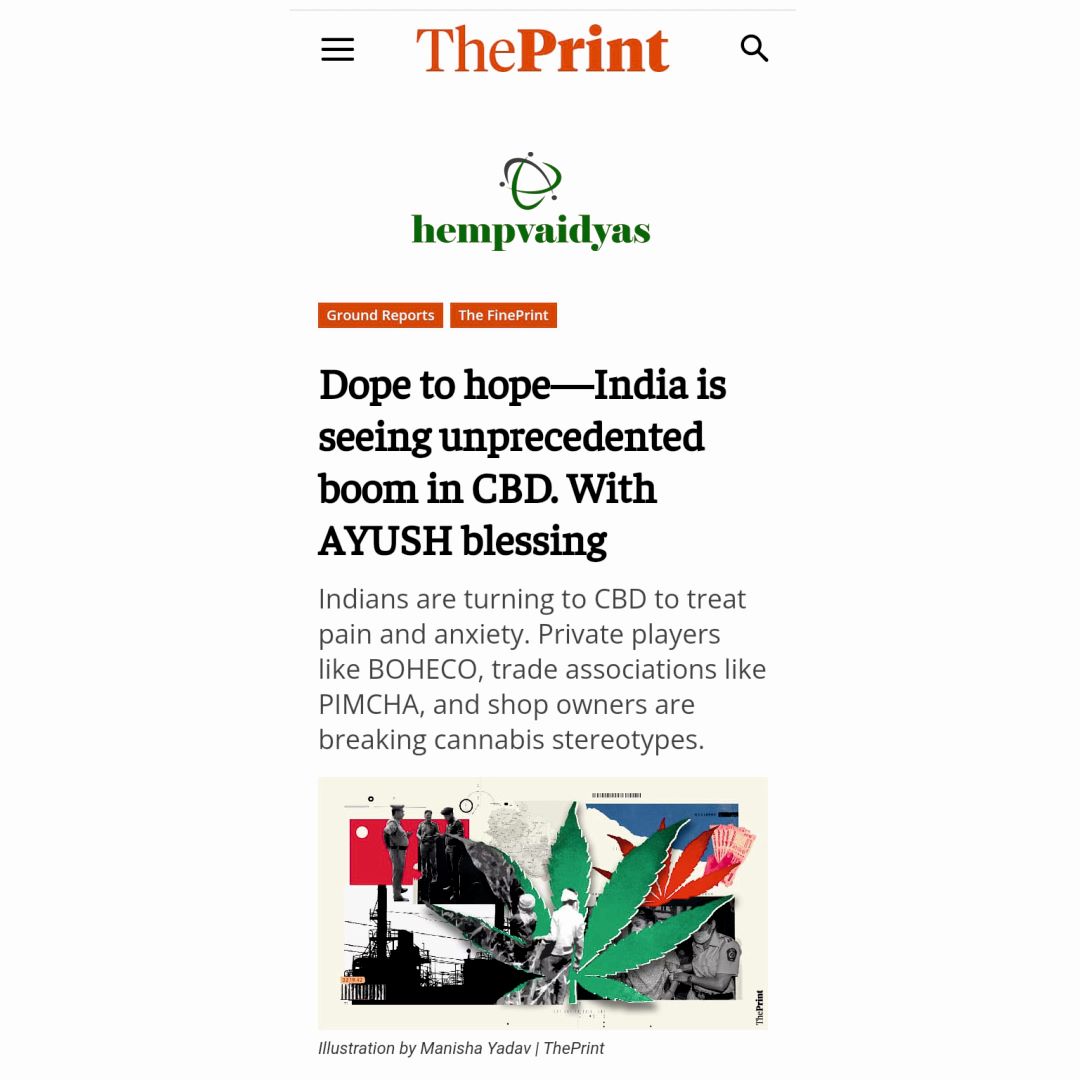Dope to hopeÔÇöIndia is seeing unprecedented boom in CBD. With AYUSH blessing
29-Jun-23 05:07:00

Indians are turning to CBD to treat pain and anxiety. Private players like BOHECO, trade associations like PIMCHA, and shop owners are breaking cannabis stereotypes.
Three years after the Narcotics Control Bureau in Mumbai cracked down on Bollywood actor Rhea Chakraborty, following the death of Sushant Singh Rajput, Indians’ tryst with cannabis is changing dramatically. Researchers and industry experts are shedding some of the fears and misconceptions about this ancient herb — the cannabis plant’s medical benefits are now coming out of the closet. There’s an unprecedented boom in the usage of cannabidiol or CBD in India — one that comes with the AYUSH ministry’s blessings.
Across social media platforms, online businesses are selling products containing cannabis derivatives and claiming that they can alleviate pain, stress, and anxiety. Contrary to popular belief, these companies aren’t doing anything illegal — they are licensed under the AYUSH ministry. Over 50 new startups have mushroomed in India over the last three years, according to Pan India Medical Cannabis and Hemp Association (PIMCHA), a Mumabi-based trade association formed in 2021 that represents legal medical cannabis and hemp businesses.
In 2018, Uttarakhand became the first Indian state to legalise industrial hemp farming. Uttar Pradesh followed suit. Three years later, the Food Safety and Standards Authority of India (FSSAI) clarified that the sale of hemp seeds and related products is standardised under the Food Safety and Standards Regulations 2011. Cannabis cultivation is legal in some districts of Rajasthan, too, and Himachal Pradesh CM Sukhvinder Singh said in April 2023 that the state government has plans to legalise cannabis production to boost the economy and trade.
According to hemp startups, Indians are becoming increasingly open to tackling pain, anxiety, and insomnia with CBD oil. Industry experts say that the NCB’s overreach in the Sushant Singh Rajput case boosted awareness around CBD oil products like never before and encouraged people to look up its medicinal benefits.
Derived from cannabis leaves, bhang was popularised through Bollywood Holi songs and Kumbh Melas. Now, CBD capsules, oral tinctures, roll ons, and body scrubs are shedding the remaining hesitation in Indian culture toward accepting cannabis.
The rise and rise of CBD
The global interest in the usage of the cannabis plant has been on the rise ever since Canada and some US states legalised the recreational and medicinal use of marijuana.
“Cannabis leaves were always a part of the Drugs and Cosmetics Act and excluded from the NDPS Act as a non-narcotic — we were just not aware of its potential,” says Varun Rungta, CEO of cannabis research company Oreka and general secretary at PIMCHA.
In India, awareness boomed when Rhea Chakraborty got involved in an alleged drug possession controversy in 2020. The tragedy of Rajput’s suicide and ensuing investigations turned into good PR for the cannabis industry — Google data from September 2020 shows a sharp peak in searches around ‘CBD’ in India.
“It was actually the two months that clocked in the highest sales for the industry in some manner because a lot of people started talking about CBD,” says Delzaad Deolaliwala, co-founder and chief legal officer at Bombay Hemp Company (BOHECO) and chairperson at PIMCHA. Narcotics officers met with BOHECO representatives to gain knowledge about the products from an industry perspective. “Before this, there was no minister, IAS officer, or authority that wanted to even discuss cannabis with us because they thought it was all bad and illegal,” he adds.
SOURCE & CREDIT: THE PRINT